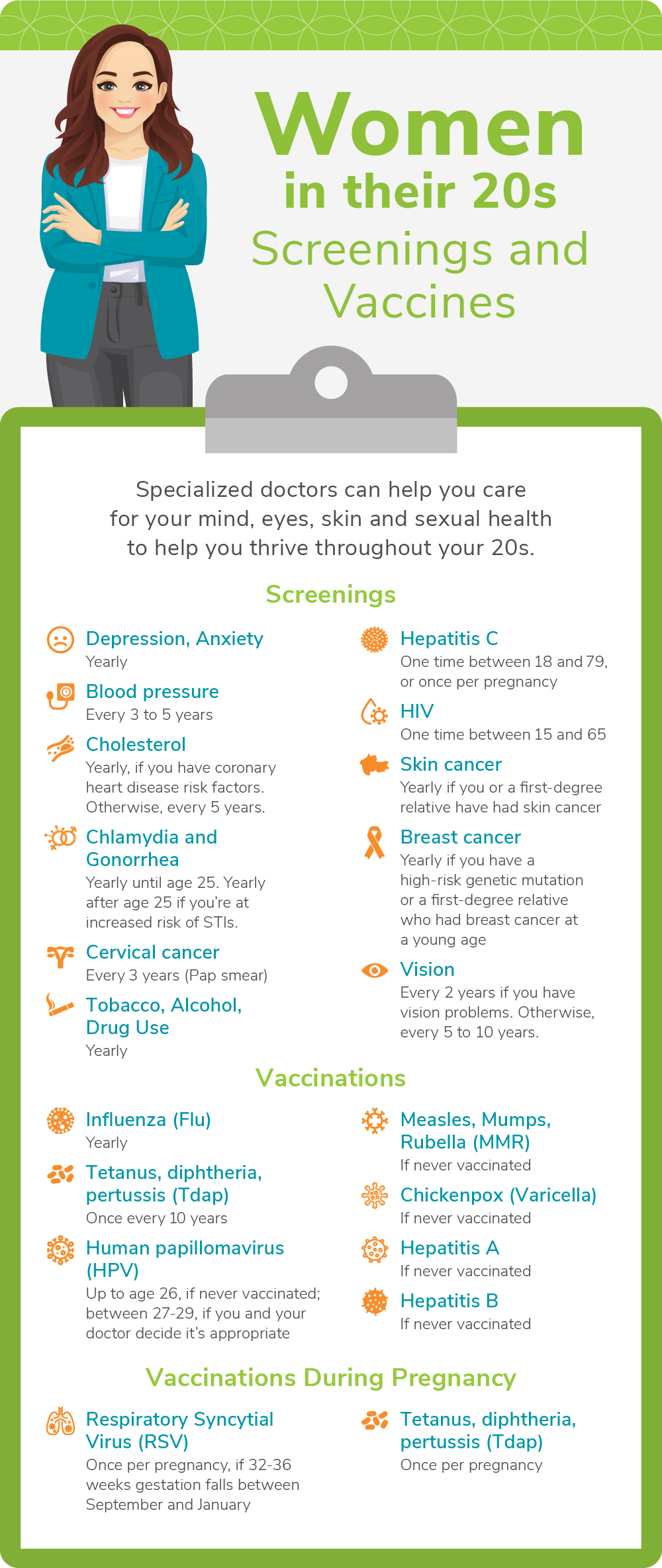Women in Their 20s Can Maximize Health
Date
February 13, 2024

Date
February 13, 2024
Credits
Medical providers featured in this article




In Brief
{{cta-block}}
Women in their 20s have an exciting decade before them: They may be going to school, starting their career or living on their own for the first time. They may have more freedom to date, socialize and explore their interests than ever before. They may even be thinking about starting a family.
With independence comes responsibility. Health experts say that the habits you adopt in your 20s can influence your health for your remaining decades.
“It’s a time in life when a lot of people are more motivated and have different stressors than they will experience later on, so it’s a good opportunity to set healthy habits,” said Gabriela Dellapiana, MD, a maternal-fetal medicine specialist at Cedars-Sinai.
{{providers}}
Build a Healthy Foundation
Take care of yourself by eating nutrient-dense foods and exercising at least 30 minutes daily.
“Committing to regular exercise is one of the most important things people can do to improve their health,” Dellapiana said. “Participating in physical activity helps to lower the risk of numerous health complications. It helps improve quality of life and overall wellbeing, and it gives you an opportunity to exercise with other people and enjoy the outdoors.”
Don’t head outside without wearing SPF 30 sunscreen, and avoid the sun during peak hours.
“Good sun protection is imperative for skin health and can prevent many of the problems that come up in our 30s, 40s and beyond,” said Sravya Bhatia, MD, a dermatologist at Cedars-Sinai. “The sun causes damage that can lead to fine lines and wrinkles, pigmented spots that people later want to correct, and—for some people—skin cancers.”
Bone health is important, too. Bones are at their strongest when women are in their 20s, before they start to lose bone density in their 30s. To maximize your bone health, eat foods rich in calcium and vitamin D in your 20s, and adopt weight-based exercises, like weightlifting.
“By building up your bone density in your 20s, you’re helping to reduce your long-term risk of osteoporosis,” Dellapiana said. “When you start having that gradual decline in the next decade of life, you’re starting from a higher place, so that you don’t end quite as low.”

More from this series: How Women Can Strengthen Their Health at Any Age
Don’t Dismiss Mental Health Concerns
It’s normal to experience occasional stress or sadness at any age, including in your 20s, but those feelings shouldn’t be overwhelming.
“If it’s becoming so burdensome that it’s difficult to get through your day, attend classes or be at work on time, then it’s time to seek out psychotherapy,” said Eynav Accortt, PhD, a clinical psychologist and director of Cedars-Sinai’s Reproductive Psychology Program. “If after a brief psychotherapy intervention—10 to 12 sessions—we don’t see a reduction in symptoms of distress, then we may want to consider medications.”
Many colleges have counseling departments, and some employer health insurance plans cover psychotherapy.
Some women in their 20s experience feelings of depression or anxiety that arise a week before their menstrual periods each month, then resolve a few days into their periods. If these feelings interfere with your daily functioning, it may be premenstrual dysphoric disorder (PMDD), a more serious form of premenstrual syndrome (PMS). Tell your doctor, because treatments are available.
“You need to speak with a physician—ideally, a reproductive psychiatrist,” Accortt said. “You may take a selective serotonin reuptake inhibitor (SSRI) antidepressant for PMDD only the week before your period, for as long as the symptoms normally last. It’s effective immediately.”
If you’re pregnant or a new mom and you experience mental health changes, seek help.
“Frequently, women experience depression and anxiety during pregnancy, exacerbated by pregnancy hormones,” said Elizabeth Kim, MD, a Cedars-Sinai OB-GYN. “This is normal. They should speak to their doctor about medications and treatment options.”
Prioritize Sexual Health
For many women, their 20s are a time for exploring their sexuality. If you’re sexually active with men, talk to your doctor about birth control; there are a number of options available.
“The biggest predictor of success with a method is when it’s something the person wants to use,” said Natasha Schimmoeller, MD, a Cedars-Sinai OB-GYN. “Some people are excellent pill takers. Others prefer something like an intrauterine device (IUD) or an implant in the arm, because that fits their lifestyle better.”
Birth control can prevent pregnancy, but options that create a barrier (like condoms or dental dams) also help prevent the spread of sexually transmitted infections (STIs), which are more common among all sexually active people in their 20s. The Centers for Disease Control and Prevention recommends that all sexually active women age 25 and younger should be tested annually for gonorrhea and chlamydia.
“Gonorrhea and chlamydia can be asymptomatic in some people, and they can cause things like infertility down the road if they’re not treated,” Schimmoeller said.
Take Control of Your Birth Control
Women in their 20s have a wide variety of birth control options. You can choose a method based on your personal preferences and lifestyle—and how often you want to think about it.
{{column-start}}
USED DURING EVERY SEXUAL ENCOUNTER
Condoms
Female condoms
Diaphragm
Cervical cap
Sponge
Spermicide
Withdrawal (“pulling out”)
TAKEN DAILY
Birth control pills
TRACKED DAILY
Fertility awareness (tracking your fertility pattern)
REPLACED WEEKLY
Birth control patch
{{column-end}}
{{column-start}}
REPLACED MONTHLY
Vaginal ring
RECEIVED EVERY THREE MONTHS
Birth control injection/shot
EFFECTIVE FOR UP TO SIX MONTHS
(only in women who are exclusively breastfeeding)
Lactational amenorrhea
EFFECTIVE FOR SEVERAL YEARS, BUT REVERSIBLE
IUD
Birth control implant (arm)
PERMANENT SOLUTIONS
Tubal ligation (tubes tied)
Vasectomy (for males)
{{column-end}}
Be Intentional About Pregnancy
If you’re planning to start a family, start taking prenatal vitamins. Make sure that you’re up to date on your vaccinations—including flu, chickenpox and rubella—which should protect you and your developing baby.
“We strongly recommend that all women get COVID-19, flu and respiratory syncytial virus (RSV) vaccinations during pregnancy, because they have been proven to be so efficacious in preventing illness in newborns,” Kim said. “Pregnant women are more susceptible to harsher illness and harsher outcomes.”
Women in their 20s with male partners should conceive within 12 months of trying to get pregnant. If you don’t, see a fertility specialist, who can identify problems or help you track your ovulation more effectively.
“For patients with conditions that might impact their menstrual cycles or ovulation, don’t wait 12 months. Get seen right away,” said Jessica Chan, MD, a reproductive endocrinologist at Cedars-Sinai. “Same-sex couples and those who are single by choice also need a specialist right away.”
Once you become pregnant, see your OB-GYN regularly. Prenatal care leads to better health outcomes for moms and babies.






